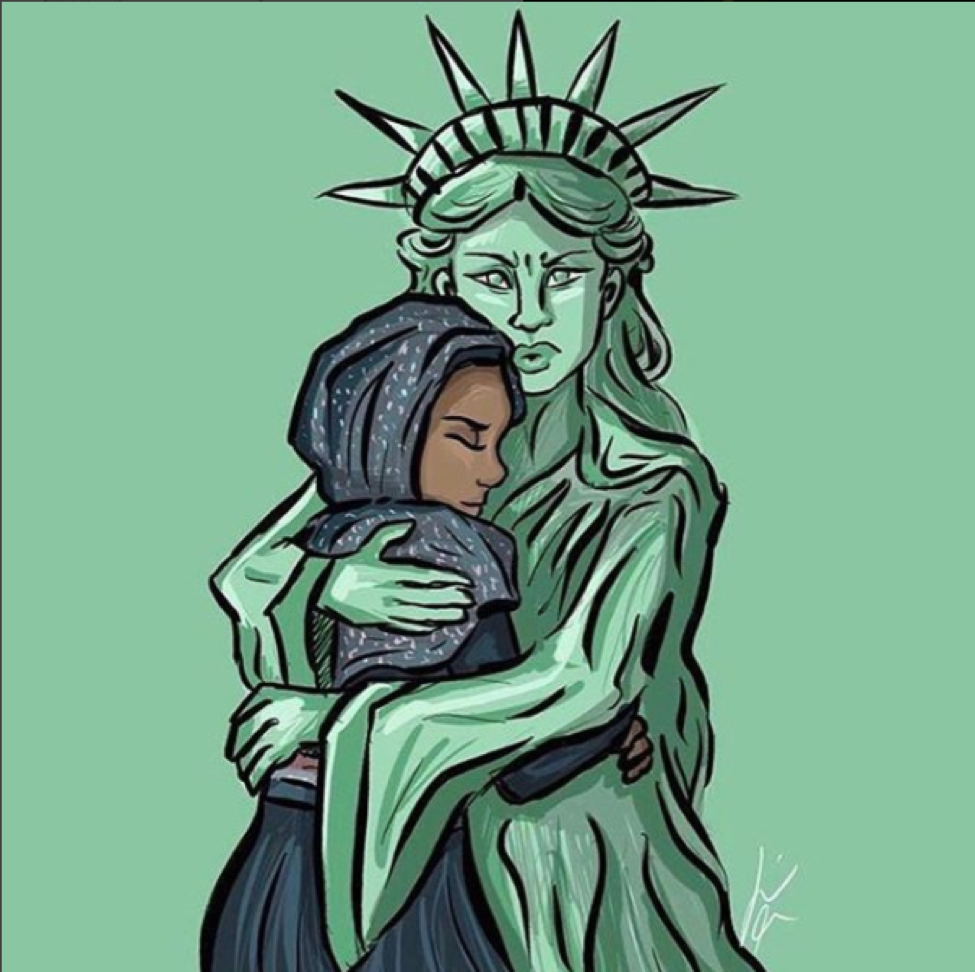“Give me your tired, your poor, your huddled masses yearning to breathe free, the wretched refuse of your teeming shore. Send these, the homeless, tempest-tossed to me, I lift my lamp beside the golden door!" – Emma Lazarus, Statue of Liberty
On Friday, January 27th, President Trump signed an executive order (EO) stopping refugee admission for 120 days, restricting immigration from seven primarily Muslim countries, and denying Syrian refugees entry indefinitely, effective immediately. Initially, the order also denied admission to permanent residents of the United States (green card holders) who were returning to the country following international travel. Since then, this portion of the order has changed and many green card holders are being let into the country on a case-by-case basis, though the rest of the EO remains intact.
Here are just a few of the many problems with this ban: First, it’s unconstitutional. The United States Constitution does not allow targeting because of religion. Though the ban does not mention Muslims, specifically, it is well known that the countries listed are majority-Muslim, making the ban a very thinly veiled effort to keep Muslims out of the United States. Second, even without the involvement of religion, the EO violates a federal law that prohibits discrimination in the immigration system on the basis of national origin.
What’s more, many of the individuals being detained or turned away are refugees, or families and students who have built a life here in the United States. One of them is MIT student Niki Mossafer Rahmati, who was returning to the country after visiting family in Tehran over winter break. Rahmati shared on Facebook that she was detained alongside “old couples trying to go and see their children in the U.S., two old women trying to be with and help their pregnant daughters there for their third trimesters, students who had just gotten their visas and families who had sold their belongings back home so they could build a better life in the U.S.” Another individual impacted by the ban is Said Hajouli, a trainee doctor from Aleppo. He fled Syria two years ago when civil war broke out, but his wife, who he hasn't seen since arriving in the US, currently lives in Turkey. She was finally on her way to join him, when she was detained at Dulles Airport.
Now is not the time for business as usual. We’ve talked a lot about the enormous impact businesses can have in responding to current crises in our world, and right now is a prime example. As such, we’ve been glad to see many companies issuing statements against the ban, and several pledging support of their many resources. Here’s who is currently leading the way:
Airbnb:
Many US residents who have been banned from returning do not have access to housing in the countries where they are currently stranded. To mitigate the issue, Airbnb is offering free housing to “refugees and anyone else who needs it in the event they are denied the ability to board a US-bound flight and are not in your city/country of residence”. To make it happen, Airbnb CEO Brian Chesky stated that the company will use its disaster response program, which asks hosts to open their homes to displaced individuals in exchange for a waived booking fee. In areas where an insufficient number of hosts offer free housing, Airbnb will subsidize associated costs. In addition, the company has agreed to match up to $1 million in donations to the UN Refugee Agency, UNHCR. Airbnb is also part of a “makeshift coalition” of tech startups organized by San Francisco startup, Github, to file a legal brief that aids litigants in a lawsuit against Trump, though little information has been released, to date.
Starbucks:
On January 29th, Starbucks CEO Howard Schultz issued a statement that the company would hire 10,000 immigrants over the next five years across the 75 countries where Starbucks stores are located. This initiative will build on Starbucks’ ongoing commitment to providing employment opportunities to veterans, military spouses, and vulnerable youth. Shultz stated that the effort would begin in the United States, focusing on military interpreters and support personnel.
Starbucks has also gone beyond just fighting the immigration ban by preparing to “help and support our Mexican customers, partners and their families as they navigate what impact proposed trade sanctions, immigration restrictions and taxes might have on their business and their trust of Americans.”
Google:
Immediately following the enactment of the ban, Google created a crisis fund that they will use to match employee donations up to $2 million. The $4 million total will go to four organizations: the American Civil Liberties Union (ACLU), Immigrant Legal Resource Center, International Rescue Committee (IRC), and UNHCR. This is the largest humanitarian fund that Google has ever put together. According to CEO Sundar Pichai, at least 147 Google employees are affected by the ban, and as an immigrant from India whose family fled persecution from the Soviet Union in 1979, the ban has felt very personal, leading him to participate in protests at SFO on Sunday.
Lyft:
In response to the immigration ban, ride share company, Lyft, made a commitment to donate $1 million to the ACLU over the next four years in support of their efforts to “defend our Constitution.” This commitment coincided with an unpopular decision by Lyft rival, Uber, to continue sending drivers to JFK during an hour-long taxi strike that was meant as an act of solidarity with airport protesters. Uber has since issued a response, stating that the company is completely against the ban and would offer financial support to any of their drivers who have been impacted.
Microsoft, Amazon & Expedia:
Following the ban, Washington Attorney General Bob Ferguson filed a lawsuit against it, which will attempt to prove it unconstitutional. Microsoft, Amazon, and Expedia, three tech giants based in Seattle, have joined the legal fight in support of Ferguson, preparing statements that demonstrate the negative impact of the ban on their businesses, and offering to testify, if and when needed.
If you’re looking for ways that you can take action, here are five things you can do right now, including making donations to organizations that are fighting the ban or supporting immigrants, joining a protest, and calling your lawmakers. Also, review this list ofgrassroots, POC-led organizations that are focusing on communities impacted by the ban, broken out by the types of services they provide.
If you know of another company that is standing up against the ban and supporting immigrants, or if you have more ideas on how we can personally mobilize for change, please get in touch with us:
As we continue to move forward in this difficult time, we are always looking for ways to connect with and support those who are fighting for good. If you’re looking for the same, don’t hesitate to reach out.



